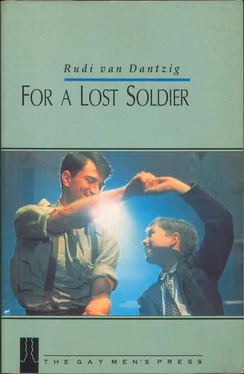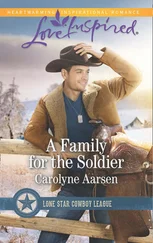Rudi van Dantzig - For a Lost Soldier
Здесь есть возможность читать онлайн «Rudi van Dantzig - For a Lost Soldier» весь текст электронной книги совершенно бесплатно (целиком полную версию без сокращений). В некоторых случаях можно слушать аудио, скачать через торрент в формате fb2 и присутствует краткое содержание. Город: Swaffham, Год выпуска: 1999, ISBN: 1999, Издательство: Gay Men's Press, Жанр: Исторические любовные романы, на английском языке. Описание произведения, (предисловие) а так же отзывы посетителей доступны на портале библиотеки ЛибКат.
- Название:For a Lost Soldier
- Автор:
- Издательство:Gay Men's Press
- Жанр:
- Год:1999
- Город:Swaffham
- ISBN:0-85449-237-2
- Рейтинг книги:5 / 5. Голосов: 1
-
Избранное:Добавить в избранное
- Отзывы:
-
Ваша оценка:
- 100
- 1
- 2
- 3
- 4
- 5
For a Lost Soldier: краткое содержание, описание и аннотация
Предлагаем к чтению аннотацию, описание, краткое содержание или предисловие (зависит от того, что написал сам автор книги «For a Lost Soldier»). Если вы не нашли необходимую информацию о книге — напишите в комментариях, мы постараемся отыскать её.
For a Lost Soldier — читать онлайн бесплатно полную книгу (весь текст) целиком
Ниже представлен текст книги, разбитый по страницам. Система сохранения места последней прочитанной страницы, позволяет с удобством читать онлайн бесплатно книгу «For a Lost Soldier», без необходимости каждый раз заново искать на чём Вы остановились. Поставьте закладку, и сможете в любой момент перейти на страницу, на которой закончили чтение.
Интервал:
Закладка:
‘He’s got the runs,’ she says, leading me back inside. ‘He’d better lie down for a bit.’
From inside the cupboard-bed I can hear them muttering about me. ‘Townsfolk aren’t used to proper food any longer, they’ve hardly got anything left. His stomach has got to get used to it first.’ But the mother protests vociferously. She is convinced now that she’s been landed with a freak of a boy when what she’d asked for all along was a girl for her Pieke! Feverish, I doze off.
Chapter 4
In the morning the grass is silver and the dew makes my socks wet. Lifting my knees high, I walk through the meadow. Meint is standing by the gate, his hair standing up in unruly tufts, a crease from his pillow running across his cheek. It is a quarter past eight, my first school day.
‘You need clogs, man, shoes are no good around here.’ My shoes are shabby and down-at-heel, the wet leather speckled with grass seed. I stamp the seeds off on the road.
‘Aren’t you going to wave to Mem?’ asks the girl. I can see the woman standing behind the window and warily raise my hand to her. I know this twisting and turning road we’re on now. Two days ago, I passed along it on a bicycle, perched behind the stranger. A road of unending loneliness.
The farmhouses are large and self-contained, noble fortresses. Every so often the wind carries the smell of smouldering wood and the sound of voices from a stable. A woman walks through a farmyard and calls something to us in a piercing voice. Meint points out the cows looming up through veils of low-hanging mist, their backs suspended mysteriously, ghostlike above the ground.
During the walk, I have to stop a few times. My breakfast comes spurting out in slimy white clots that land back onto my clothes because of the wind. I bend over, with tears in my eyes, fretting with anxiety as Jantsje and Meint look on in amazement.
The school is still a long way off, more than half an hour’s walk. Sick to my stomach, I walk along the village street. We pass the church and suddenly I recognise a small structure.
‘The Sunday school,’ says Meint and Jantsje pulls a face. For a moment I look up hoping the lorry may still be there, tucked away in some corner hidden from view. Or maybe it will be coming back to deliver the next batch of children. I must keep an eye on this place, I mustn’t let any opportunity slip by.
There is a low building just past the crossroads with a small yard in front. Resignedly I follow Meint and Jantsje through the waiting children. There are curious glances and Meint looks proud: ‘He’s come from the city to live with us.’
The low building has just four classrooms, tall, stark places with grey-painted walls, no pictures or drawings, nothing.
Plain and empty.
The windows start high up the walls and the window-sills are bare. It is as if everyone abandons this place as quickly as possible after school. I think of our White School in Amsterdam, the sun and the plants which the teacher carefully tends, pinching out the overblown flowers.
I stop at the door and watch as the schoolmaster comes in and walks up to the window. He tugs at a rope and a small window at the top swings open with a big bang. I catch my breath. He beckons me imperiously with a crooked finger and points to a seat at the back. In front of me I see Meint’s familiar head. There are some eight or ten children in the class, each with a desk to himself. It’s a strange school: between the two classrooms is a door that stays open so that the master can give lessons to two classes at once. I hear his voice through the door, and another window being swung open. When we pray – the master standing in the doorway, head bowed – the silence of the village floats in over us through the open windows. The class is taking dictation while I look on. There is a girl who isn’t doing anything either, I know her from the lorry. You can tell from her clothes that she’s from the city because her dress is colourful and gaudy in comparison with the other girls’. It’s just as if she and I were wearing our Sunday best for school. Now and then she gives me a reproachful look. I’d like to get to know her, but have no idea how to set about it. Should I give her some sort of sign perhaps?
The master delivers his lesson slowly and drowsily, there seems no ending to it. The incomprehensible sound of his voice makes me tired and I try to smother my yawns and pretend to be looking for something in the little locker under my desk.
We troop outside in small, silent groups. Break. There is no shoving, no shouting, no laughing. Everything is orderly and grown up.
We walk up and down the yard for a while, some walking with the master, others waiting patiently by the school wall until they can go back in.
There are no houses behind the school, you can look right across the fields as far as the sea-dyke. I can see the hilltop of the Cliff rising upwards. The bleak landscape, open and without secrets, the emptiness blowing in to meet you.
When we go back into the classroom Jan has suddenly, mysteriously, appeared out of nowhere. I leap up at my desk and try excitedly to attract his attention. Jan is my mainstay, the two of us together will be able to run away from here and get back home. And if we come across Greet)e from Bloedstraat we can take her along too. I can just see it, three children roaming through the countryside in search of their home. Like in a book.
Jan is put at the desk in front of me. His self-assured eyes glance briefly in my direction, but there is no recognition in his look or pleasure at our unexpected reunion.
T think all the evacuees are here now,’ says the master. What has happened to the rest, I wonder, where have they got to? Swallowed up in the far reaches of these lonely parts? We have to write down our names and ages on a piece of paper and the names of the families who are putting us up. Without so much as glancing at them, the master puts the papers on his table and goes through into the other class.
To the amazement of the others in the room, Jan immediately turns around in his seat. He smiles at me and starts to talk. I shrink back and signal ‘sh!’ with my finger. We mustn’t draw attention to ourselves straight away. That could ruin our plans.
‘What a filthy walk it is to this place. I couldn’t find it at all at first. They won’t be seeing me here very often, believe me.’ He looks around the classroom. ‘Backward dump. What on earth do you think we’re going to learn here, not a lot, that’s for sure!’
I look at his insolent expression and jerkily-moving head. As he talks he puckers his freckled nose, and his tongue darts rapidly across his lips as if he is gulping something down.
‘I’m on a big farm. It’s great, lots to do. They’ve got two small children. I’m going to ask them to let me skip school. I’d much sooner help with the animals.’ He gives a snort. ‘Where have they stuck you? Here, in the village?’ He pulls me over towards him and whispers in my ear, ‘I’m sure you could come and stay with me. I’ll ask them at home.’
The master appears in the door and glowers into the classroom. His eyes are dull and disapproving. T can see three new faces,’ he says. ‘From the city, from Amsterdam. Perhaps you are all used to something else at school there, but here there is no talking during my absence. If you don’t understand something, you put up your hand. And I think…’ he seizes my collar and marches me to a desk at the very front, ‘I think it is better if you don’t sit too close together.’
His footsteps echo emphatically through the classroom. He draws the curtains to dim the sunlight which is streaming through the open window. ‘I take it you come from a Christian school?’
Читать дальшеИнтервал:
Закладка:
Похожие книги на «For a Lost Soldier»
Представляем Вашему вниманию похожие книги на «For a Lost Soldier» списком для выбора. Мы отобрали схожую по названию и смыслу литературу в надежде предоставить читателям больше вариантов отыскать новые, интересные, ещё непрочитанные произведения.
Обсуждение, отзывы о книге «For a Lost Soldier» и просто собственные мнения читателей. Оставьте ваши комментарии, напишите, что Вы думаете о произведении, его смысле или главных героях. Укажите что конкретно понравилось, а что нет, и почему Вы так считаете.











